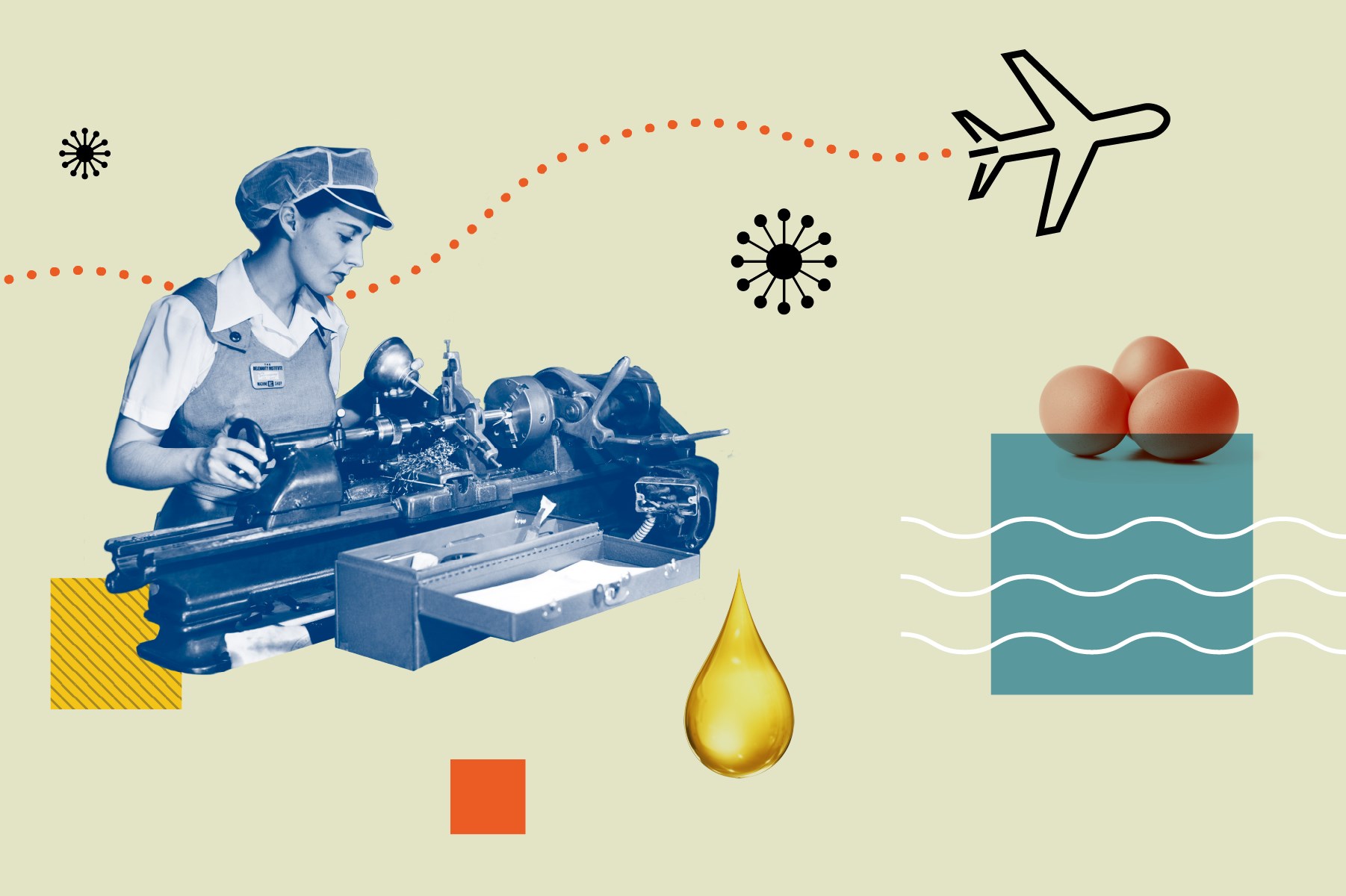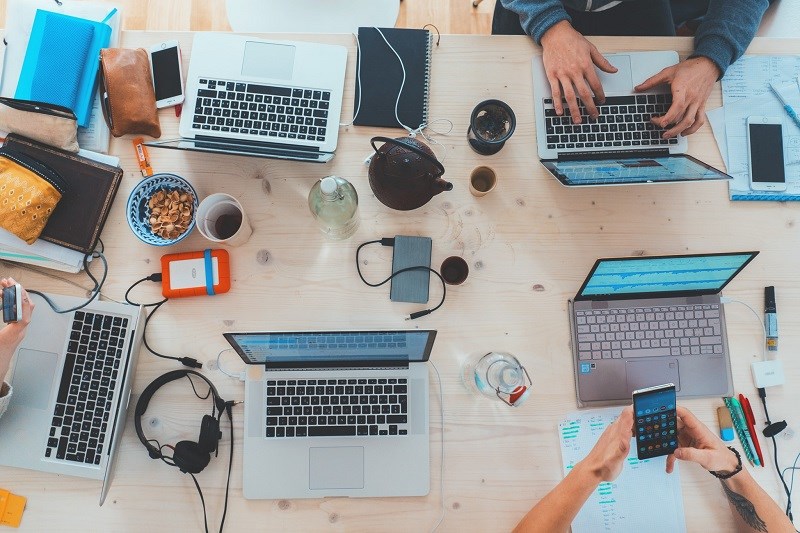
"The new normal" has become part of our lexicon this year, in all areas of life.
Will it become "normal" to wear masks during flu season? Will companies decide that workers are just as productive from home and fully embrace remote work? Will consumers permanently close the door on shopping at brick-and-mortar stores in favor of ordering groceries and supplies online?
To investigate the means through which these shifts could happen—and the likelihood that they will—we identified three main ways the coronavirus could shape the economy long after the pandemic has subsided:
- Habits could evolve, causing lasting change in consumer behaviour. As an example of the impact of habits, consider the rise of recycling in the US over the past several decades. This shift was due in part to the advent of Earth Day in 1970 and the nationwide campaign encouraging Americans to "reduce, reuse, recycle." The Environmental Protection Agency reported that 34.7% of municipal solid waste was recycled in 2015, as compared with just 6.6% in 1970.
- Fear can make consumers reluctant to engage in certain activities—in this case, fear of the next pandemic (including a Covid-19 resurgence). An instance where fear led to consumer shifts is when research in the 1960s demonstrated the health risks of smoking cigarettes. This led to a permanent reduction in cigarette sales—approximately 42% of US adults smoked in 1964, compared with approximately 19% in 2011.
- Sunk costs, or costs that have already been incurred and cannot be recouped, could change the long-term plans of consumers and firms. A classic example of sunk costs is the Concorde. British and French manufacturers poured such exorbitant sums into developing the aircraft in the 1950s and 60s that the jet never became profitable over the decades it was commercially available. (This was such a notorious incident that the sunk-cost fallacy is sometimes also referred to as the Concorde fallacy.)
We explored these three avenues to try to understand what the world could be like after Covid-19. To get a sense of how they've taken shape in the past, and what this could mean for the present moment, we considered five historical events that we believe are comparable to the Covid-19 pandemic:
- World War II and rationing
- World War II and female labour force participation
- The oil price shock of the 1970s
- 9/11 and air travel
- Pandemics of recent history
We analysed the overall impact of each of these events on long-term economic behaviour, and gauged whether habits, fear, and sunk costs fundamentally changed the way people and businesses acted in their aftermath.
What Changes Consumer Behaviour?
There are three key themes that we think could affect the post-pandemic world: 1) the increase in working from home; 2) the future of industries that were severely hit by social distancing concerns during the pandemic, such as dine-in restaurants, air travel, hospitality, and large events; and 3) increased adoption of e-commerce and other digital services.
The chart below maps out how we think each of these themes will be influenced by habits, fear, and sunk costs.
Habits have evolved during the Covid-19 pandemic as a result of social distancing concerns, as many people have cut back on normal activities such as eating at restaurants, traveling by air, attending large events, and shopping at physical stores.
Will this short-term shift in habits lead to long-term changes in consumer behaviour? Companies and industries impacted by this reduction in demand are underperforming in the market, implying that investors think it will.
Many of the industries shaped by changes in habits are the same ones that could be impacted by fear of the next pandemic or a Covid-19 resurgence. It's difficult to predict how this fear will shape consumer behaviour—especially once an effective vaccine is developed and distributed—but awareness around the possibility of another pandemic may linger in people's minds. While the odds that anyone will continue to avoid eating in a restaurant because of that risk seem low, it's possible that fear may remain around the largest and densest kinds of social gatherings (such as public transit or air travel).
There's also the matter of sunk costs, which are probably the least intuitive and least discussed of the three concepts. Essentially, the pandemic has forced consumers and firms to incur costs they otherwise would not have; for instance, purchasing home office equipment to facilitate remote working. Once the pandemic is over, the impetus for the purchase decision will have disappeared, but people will still have the home office equipment, so working from home will continue to be marginally more attractive.
Sunk costs can also come in other, non-monetary forms, like time. Consider that the surge in working from home has required extensive time on the part of managers, as they've needed to craft work-from-home capabilities, such as drawing up policies and learning the best ways to communicate with remote workers. This may not have been considered a valuable use of their time before the pandemic, but now that firms have been forced to incur this cost, the issue is no longer relevant, and the necessary work-from-home systems are in place.
Do Extreme Shocks Drive Long-Term Behaviour?
To better understand how the world might look different after Covid-19, we used these three concepts in our analysis of the five analogous historical episodes that had a significant short-term impact on consumer behaviour.
The exhibit below maps out the degree to which each of these episodes led to fundamental long-term changes in economic behaviour, based on these three means.
Altogether, our analysis of these historical episodes indicates that there's, at best, modest support for the idea that Covid-19 will affect long-term consumer habits.
Each of these shocks had some impact on short-term consumer behaviour, but more often than not, habits eventually reverted to more closely resemble previous behaviours and fear subsided sooner or later. Though each episode was unique, we note that sunk costs were the means through which a longer-term impact most frequently occurred. Here we look at a couple of these examples in depth:
Food Rationing During World War II
The UK was subject to rationing of some combination of petrol, meat, fish, cheese, and more between 1939 and 1954. The UK imports approximately 70% of its food and was therefore exposed to massive supply-chain disruption as a result of World War II. The rationing continued after the war as the UK redistributed food and resources to war-devastated countries under British control.
Did this period of deprivation have a lasting impact on consumer behaviour? The fact that it lasted for so long makes the possibility of permanent change seem more likely.
The exhibit below shows the sharp negative impact that rationing had on the demand for key food items. At their respective troughs, per capita meat consumption declined as much as 32%, fat (butter, margarine, and others) 21%, sugar 35%, and eggs 64%.
However, Brits clearly didn't get accustomed to these austere eating habits. Food consumption rebounded in the early 1950s as rationing was relaxed, and by the mid-1950s, consumption of meat, fat, sugar, and eggs was far in excess of prewar levels.
Therefore, wartime rationing didn't have a noticeable long-term economic impact; in general, our analysis shows that demand for rationed goods fully recovered after the war.
Did 9/11 Permanently Depress Air Travel?
The state of US air travel after September 11, 2001 also has clear similarities to the current situation.
Just as fear of Covid-19 has driven recent short-term decreases in demand for air travel and other high-density activities, consumers' fear of terrorist attacks after 9/11 led to a significant decline in air travel for several years. According to a Gallup survey conducted immediately after 9/11, 43% of Americans said they were less willing to fly on airplanes because of the attacks. This number remained at about 30% throughout 2002.
Additionally, this fear of air travel after 9/11 may have brought about a permanent change in consumer habits.
The chart below shows the significant short-term impact of 9/11 on US air travel. Industry revenue passenger miles (the standard way of gauging airline industry volume) and the number of passengers lagged real gross domestic product in the years after 9/11.
However, the chart also shows that the short-run economic impact of 9/11 started to dissipate in 2004. Revenue passenger miles began catching up to GDP and, by the later 2010s, the ratio of air travel to GDP had even surpassed pre-9/11 levels. At least at the big-picture level, 9/11 had a marginal long-term impact on air travel, despite the substantial shock in the short run.
We did identify one larger long-term economic impact of 9/11 on air travel: business travel. We think that as business customers were forced to cancel work trips in the immediate aftermath of 9/11, they realised that the telephone and newer communications technologies like email were effective substitutes for these trips. This caused a structural shift in the market and allowed more leisure-focused low-cost carriers to take on greater market share. It also forced legacy carriers to retreat to international travel, which is more structurally protected from low-cost competition.
How applicable are these lessons to understanding the post-Covid world? The big picture is that air travel post-9/11 mostly recovered in aggregate, even after being depressed for a multiyear period. Short-haul business travel did appear to be permanently affected, but it's possible that this trend would've played out either way with the advent of new communications technologies.
For that reason, we think 9/11 had at most a modest impact on long-term air travel. The fear initially created by the attacks did depress consumer demand for air travel in the short run, but this effect eventually faded.
The Economic Impact of Other Pandemics
Finally, we examined the history of recent pandemics for lessons on Covid-19's potential impact on economic behaviour.
The most severe pandemic in recent history was the Spanish flu of 1918-20, which resulted in at least 50 million deaths across the globe. This pandemic caused massive short-term disruptions to society, and familiar social distancing measures—face mask mandates, school and theater closures, and cancelled public gatherings—were enacted in order to contain the virus. While some studies have concluded that social trust deteriorated as a result of the Spanish flu, it's difficult to reach any concrete conclusions about its economic impact, since it occurred roughly concurrently with World War I.
As for other 21st century pandemics (like SARS, H7N9, and H1N1), these episodes had nowhere near the short-term impact of Covid-19, though they may have contributed to a few minor changes. For instance, SARS led to the widespread acceptance of face masks in China and Hong Kong and may have played a supporting role in China's e-commerce adoption.
Potential Changes to Economic Behaviour
There is considerable debate about what we can expect for the long-term economic impact of Covid-19. Perhaps the pandemic will dramatically accelerate ongoing shifts in the economy (such as the shift from brick-and-mortar retail to e-commerce), or perhaps it will create new trends entirely (such as permanent shifts away from dine-in restaurants or air travel). Equity markets are implying a major reshaping of the US economy compared with how it looked before the pandemic.
While we believe that the long-term economic calculus of consumers and firms may be impacted by shifting consumer habits, lingering fear, and sunk costs incurred, our analysis of five similar historical episodes suggests that these resulting changes will be modest at best. Our analysis indicates that consumer habits eventually revert, and fear eventually dissipates. It's sunk costs that have the largest—yet still a modest—impact on long-term consumer behaviours.





























